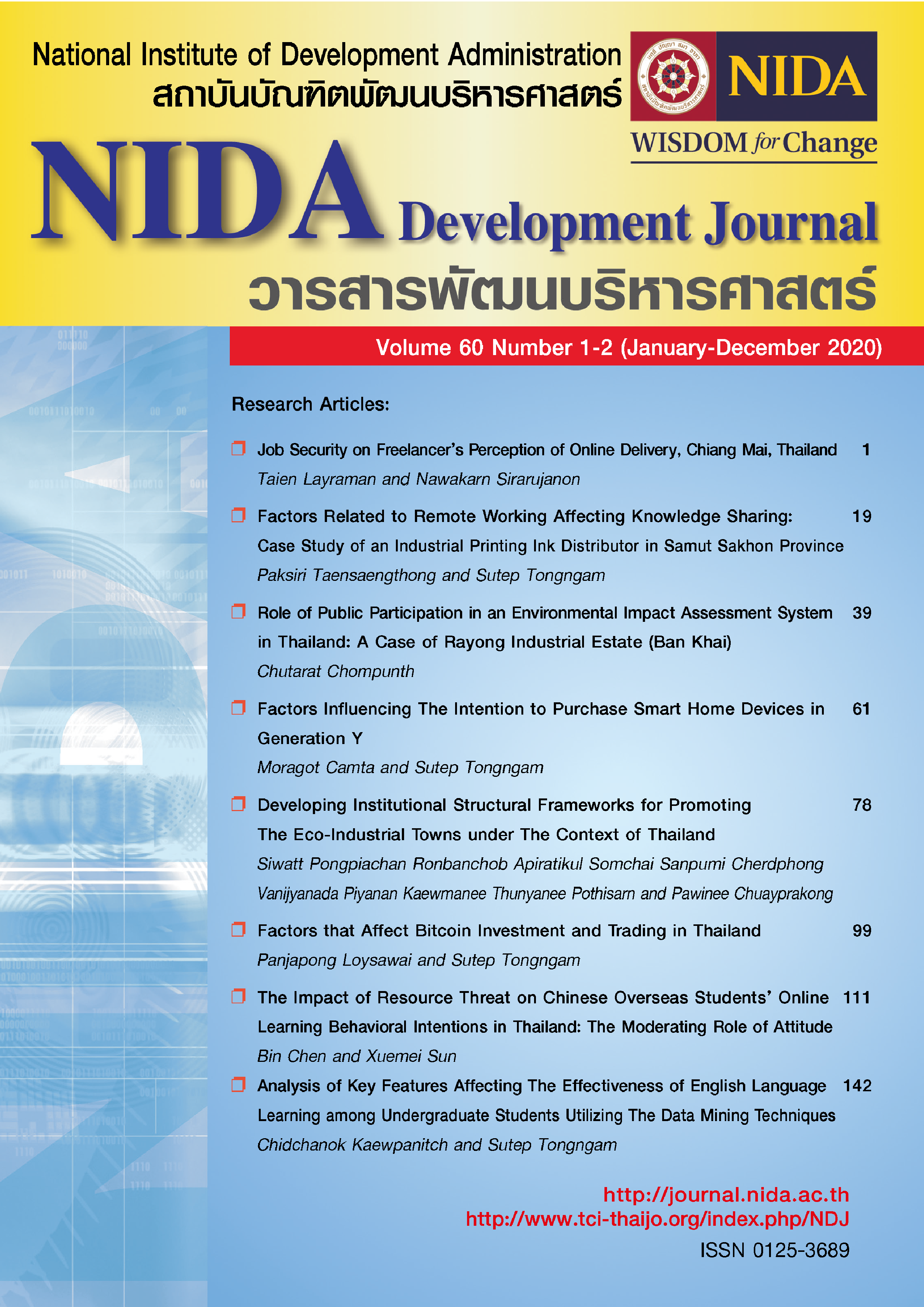Factors Related to Remote Working Affecting Knowledge Sharing Case Study of an Industrial Printing Ink Distributor in Samut Sakhon Province
Keywords:
Remote Working, Knowledge Sharing, Influencing Factors, BehaviorAbstract
Nowadays, the work model is becoming more off-site work and more work from home. Technology and equipment that can support work, internet connection, and well-allocated work environment will help reduce stress and increase concentration during work, as well as increase job satisfaction for employees. But on the other hand, working in a distraction-filled office creates stress and results in lower job satisfaction. Knowledge sharing is one of the important factors to develop an organization’s competitiveness. It directly contributes to skill development of employees. The researchers therefore observed the behavior of knowledge sharing during remote working to find out what factors might influence employees to share more or less useful knowledge with their colleagues. Hence, there was an interest in research study on the effect of remote working on knowledge sharing and related factors. The selected factors consisted of four aspects namely job satisfaction, trust in colleagues, interpersonal bond, and perceived organization support. The census was collected from an industrial printing ink distributor in Samut Sakhon Province in the form of online questionnaires and set of questionnaires.
The research results revealed that remote working had positive effect on the factors of job satisfaction, perceived organization support, and behavior of knowledge sharing significantly but it had negative effect on the factor of interpersonal bond. The factor of trust in colleagues had no statistical significance. It was concluded that remote working did not affect the trust in colleagues.
References
Allen, T. D., Golden, T. D., & Shockley, K. M. (2015). How effective is telecommuting? Assessing the status of our scientific findings. Psychological Science in the Public Interest, 16(2), 40-68.
Baernholdt M & Mark BA. The nurse work environment, job satisfaction and turnover rates in rural and urban nursing units. J Nurs Manag. 2009 Dec;17(8):994-1001.
De Vries, R. E., Van den Hooff, B., & de Ridder, J. A. (2006). Explaining knowledge sharing: The role of team communication styles, job satisfaction, and performance beliefs. Communication research, 33(2), 115-135.
Eisenberger, R., Cummings, J., Armeli, S., & Lynch, P. (1997). Perceived organizational support, discretionary treatment, and job satisfaction. Journal of applied psychology, 82(5), 812.
Fonner, K. L., & Roloff, M. E. (2010). Why teleworkers are more satisfied with their jobs than are office-based workers: When less contact is beneficial. Journal of Applied Communication Research, 38(4), 336-361.
Golden, T. D., & Raghuram, S. (2010). Teleworker knowledge sharing and the role of altered relational and technological interactions. Journal of Organizational Behavior, 31(8), 1061-1085.
Golden, T. D., Veiga, J. F., & Dino, R. N. (2008). The impact of professional isolation on teleworker job performance and turnover intentions: Does time spent teleworking, interacting face-to-face, or having access to communication-enhancing technology matter?. Journal of Applied Psychology, 93(6), 1412.
Lu, L., Leung, K., & Koch, P. T. (2006). Managerial knowledge sharing: The role of individual, interpersonal, and organizational factors. Management and Organization Review, 2(1), 15-41.
Makin, P. J., Rout, U., & Cooper, C. L. (1988). Job satisfaction and occupational stress among general practitioners—a pilot study. The Journal of the Royal College of General Practitioners, 38(312), 303-306.
NIA (2020). NIA reveals the results of a survey of people in the new generation in organizations who prefer to work in a Work From Home style that meets their lifestyle needs. (2020). Retrieved 10 July 2020, from https://techsauce.co/pr-news/nia-new-normal-covid-19- work-from-home
Parichat Yepitak and Teerawat Chantuk. (2016). Perceived organizational support and job satisfaction affect organizational well-being. Veridian E-Journal, Silpakorn University (Humanities, Social Sciences and arts), 9(1), 643-654.
Saowaruj Rattanakhamfu and Methavee Rachatavijin (2020). The impact of working from home during COVID-19: a case study of TDRI - TDRI: Thailand Development Research Institute. (2020). Retrieved 9 July 2020, from https://tdri.or.th/2020/05/impact-of-working-from-home-covid-19/
Sarti, D. (2018). Organizational tenure and knowledge-sharing behaviours. Journal of Workplace Learning.
Trivellas, P., Akrivouli, Z., Tsifora, E., & Tsoutsa, P. (2015). The impact of knowledge sharing culture on job satisfaction in accounting firms. The mediating effect of general competencies. Procedia Economics and Finance, 19, 238-247.
Downloads
Published
How to Cite
Issue
Section
License
Copyright (c) 2024 NIDA Development Journal

This work is licensed under a Creative Commons Attribution-NonCommercial-NoDerivatives 4.0 International License.





